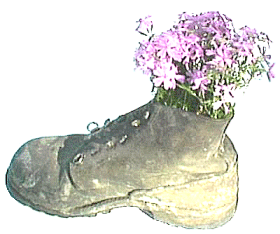Footwear falls into the 'extremely
personal' category. In other words: you're on your own!!
You will probably not find anyone recommending a particular brand
name & model of footwear for hiking for several reasons:
- First of all, the average hiking
boot or shoe seldom has a long production life. Let's face it,
clothing is fashion driven, and this includes hiking shoes and
boots as well. Even the hiking boot undergoes fashion changes;
a new colour, a new gimmick, a new fashionable name, etc.
- The availability of the particular
item in your area; a Swiss army knife is available world wide,
a piece of footwear rarely makes it out of the country.
So where does this leave the
ultralight hiker?
| To
boot or not to boot.... |
 Well, let's get
this out: Once again (and since this is ultralight-hiking.com),
you can rely on the ultralight motto: lighter is better! Well, let's get
this out: Once again (and since this is ultralight-hiking.com),
you can rely on the ultralight motto: lighter is better!
The ultralight hiker's
footwear = running shoes!
Extra weight on the foot is probably the most 'hard working'
weight. The foot goes up and down much more than your back —
hopefully!
If we list the footwear choices by weight, starting with the
heaviest first, the list would look something like this:
- Heavy military style leather
boot
- Gum boot (or rubber boot)
- Leather hiking boot
- Hiking shoe
- Running shoe
Since a shoe is lighter than
a boot, is a shoe the better choice? Most long distance hikers
would say yes. The common argument is, that hiking footwear has
to give total ankle support. If you want to have the ankle support,
there are some fairly lightweight choices out there. It's up
to you.
The lightest athletic shoe normally is the running shoe. Some
of these are very light, but be careful; some come with lots
of fashion gimmicks that add unnecessary weight.
Wet feet is part of the game.
The trick is to have 'fast' drying footwear, and the running
shoe dries a lot faster than a big boot.
The socks will have an impact
on your foot comfort.
The ultralight hiker's
choice = thin nylon!
Although
wool socks will give you warmth like no other, the lightest are
the thin nylon types. These are also quite cheap.
|